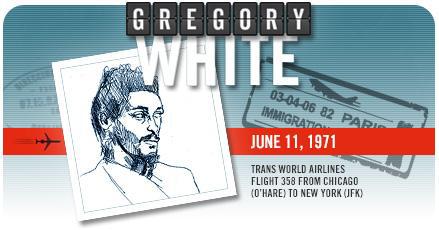In the late 1960s and early 1970s, the United States suffered through a skyjacking epidemic that has now been largely forgotten. In his new book, The Skies Belong to Us: Love and Terror in the Golden Age of Hijacking, Brendan I. Koerner tells the story of the chaotic age when jets were routinely commandeered by the desperate and disillusioned. In the run-up to his book’s publication on June 18, Koerner has been writing a daily series of skyjacker profiles. Slate is running the final dozen of these “Skyjacker of the Day” entries.
Name: Gregory White
Date: June 11, 1971
Flight Info: Trans World Airlines Flight 358 from Chicago (O’Hare) to New York (JFK)
The Story: No one was surprised when the first passenger was killed by an American skyjacker. Such a tragedy was inevitable given the unhinged nature of the characters who seized planes with guns, knives, or jars of acid. But to those who knew him well, Gregory White seemed an unlikely murderer.
The 23-year-old White lived in a working-class Chicago suburb with his wife and two children, whom he supported as a railroad clerk. He had a weakness for liquor, a character flaw that had resulted in a few disorderly conduct arrests over the years. But nothing about White’s history suggested that he was capable of violence.
On the night of June 11, 1971, White showed up at O’Hare International Airport carrying only a folded umbrella. He strolled through the terminal and onto the tarmac, where he queued to board TWA Flight 358. He made it to the top of the Boeing 727’s stairs before a flight attendant asked to see his boarding pass. Rather than comply with this polite request, White pulled a pistol out of his umbrella, grabbed the flight attendant by the throat, and pressed the gun to her forehead.
“North Vietnam,” said White, his slurred speech revealing that his bravado was fueled by alcohol. “We’re going to North Vietnam.”
A man who had boarded the flight ahead of White, a 65-year-old management consultant named Howard Franks, turned around and moved back toward the stairs. Perhaps he meant to help the imperiled flight attendant, or maybe he was oblivious to the drama and just wanted to retrieve an item from his hanging coat. His true intent will never be known because White shot him twice—first in the head, then again in the back.
Screaming passengers stampeded off the plane, pushing past the hijacker and Franks’ lifeless body. When the chaos settled, White reiterated his demand: North Vietnam. And he wanted $75,000, too, as well as a fully loaded machine gun.
After Franks’ body was removed from the nearly empty plane, the flight proceeded to JFK Airport, where White was told he could transfer to a larger jet capable of travel to Southeast Asia. En route to New York, White told a flight attendant that although he regretted leaving behind his wife and children, he felt “just destined to go to North Vietnam.”
After landing at JFK, White stuck his head out the cockpit window to survey the scene. He saw something move in the darkness beneath the plane’s right wing—a man crouched low to the asphalt. White fired once at the trespasser and missed; the man, an FBI agent who was working his second hijacking in as many weeks, fired back and pegged White in the left bicep. The bleeding skyjacker meekly surrendered at once.
Two days later, as White was wheeled out of the hospital by federal marshals, a reporter shouted out, “Why were you going to Vietnam?”
“I wanted to bring arms to help the people there fight,” White yelled back. Prior to the hijacking, he had never expressed the slightest hint that he cared about the war.
The Upshot: TWA was roundly criticized for having permitted White to reach the top of the boarding stairs despite the fact that he wasn’t a ticketed passenger. But the airline rejected the notion of altering its airport security policies even the slightest bit. “How far can the airlines go?” replied a TWA spokesman when asked whether his employer planned to make any changes to its boarding procedures. “Restrict everyone from the terminal except those who have a ticket? Stop everyone from entering the airport area except those who have a ticket?” White, meanwhile, was ruled incompetent to stand trial and committed to a state mental hospital in Chester, Ill.
